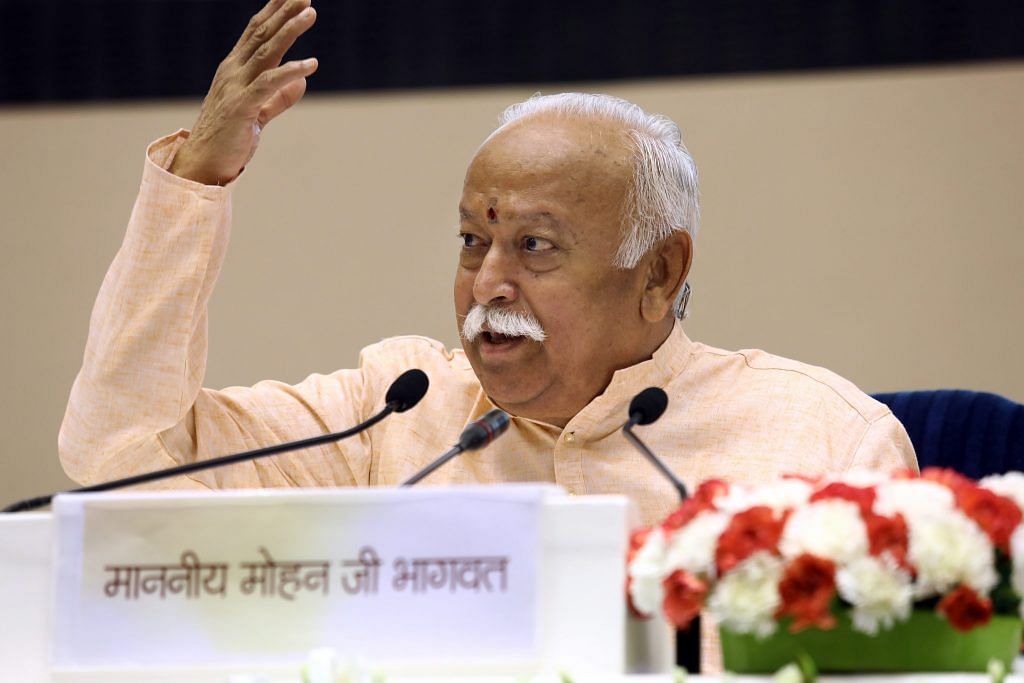RSS chief Bhagwat talks of SC striking down Section 377, says it’s important to change with time but also need to address ‘aswasthata’ in society.
New Delhi: Rashtriya Swayamsevak Sangh (RSS) chief Mohan Bhagwat Wednesday said he wanted a Ram temple to be built on the disputed site in Ayodhya very soon. He claimed that if done, it will remove a “major cause of the rift between Hindus and Muslims”.
“As RSS chief, I want the grand Ram temple to be built at the Ram Janmabhoomi very soon. If this is done, one major reason for the tension between Hindus and Muslims will be dealt with,” Bhagwat said.
“Had it not been for politics over the issue, this would have happened long ago. If a temple is built there with consensus, there will be no more pointing fingers at Muslims”.
Also read: RSS interpretation of Hindutva does not exclude Muslims: Mohan Bhagwat
Bhagwat was responding to questions on a gamut of issues on the concluding day of the Sangh’s three-day conclave, Bharat of Future: An RSS Perspective.
Asked about why the minority community has a fear of the Sangh, the RSS chief said the definition of “minorities” itself wasn’t clear.
“The definition of alpsankhyak (minorities) isn’t clear. The Sangh disagrees with the use of the word,” he said.
“Before the British rule, we never used this term. We are the children of one country and should live as brothers, and not use terms like minority and majority communities”.
He also claimed the “Muslims who live closer to RSS shakhas feel safer”, and said those who fear the organisation should see its working.
“We are all Hindus by identity but it doesn’t mean we don’t consider Muslims as our own,” he added.
On the final day, Bhagwat also touched upon a number of issues — from Article 370 and 35A, the Uniform Civil Code (UCC) to cow vigilantism and homosexuality.
On decriminalisation of homosexuality
The sarsanghchalak adopted a complex position on the Supreme Court’s striking down of Section 377 that criminalised homosexuality. While he said it was important to change with time, he also spoke of addressing “aswasthata” (unhealthiness) in society.
“We need to change with the times. Everyone is equally a part of society,” Bhagwat said, even as he added that provisions had to be made to address aswasthata in a healthy society so people don’t fall off the margins.
In recent times, the RSS has maintained that although homosexuality should not constitute a crime, the Sangh does not approve of it socially.
On cow vigilantism, demographic change, UCC
Bhagwat said while “gau raksha” (cow protection) was necessary, violence on any pretext was wrong.
“Taking the law in your hands or resorting to violence for anything is wrong and should be punished. But gau raksha is necessary. Many Muslims in our country also protect the cow with devotion,” he said.
Bhagwat also said that if voices are raised against violence by cow vigilantes, they should also be raised against cow smuggling. “We should stop these double standards,” he said.
To a question on the fears of “changing demographics due to a rising Muslim population”, he said, “Maintaining demographic balance is significant. Keeping this in mind, a population control policy is needed and it should be applied to all sections equally… Demographic imbalance also occurs because of infiltration.”
On the Uniform Civil Code, he said it should be the guiding principle and the country should be under one common law.
On Article 370 and 35A in J&K
Amid a heated debate around Article 35 A in Jammu and Kashmir, with the matter now before the Supreme Court, Bhagwat put forth the Sangh’s unequivocal stance that both, 35A and Article 370, should be scrapped.
“We don’t agree with both. We think both should go,” he said.
The abolition of Article 370 and 35 A, which grant special privileges to J&K, has consistently been on the BJP’s agenda.
On caste-related issues
The sarsanghchalak sought to portray the Sangh as an organisation that does not believe in caste discrimination.
“The RSS fully supports roti-beti relationship between various Hindu communities. If you look at the percentages of inter-caste marriages in India, the highest will be among swayamsevaks,” he said.
On the issue of reservations, Bhagwat said the Sangh “fully supports all reservations provided by the Constitution to remove social inequalities and will continue to do so”.
“Reservation isn’t the problem, it is the politics of reservations that is,” he said.
On the amendments to the SC/ST Atrocities act brought in by the BJP government, Bhagwat said the act needs to be “implemented properly but not misused”.
The Sangh’s political standing
Much like on the first two days of the conclave, Bhagwat sought to underline that the Sangh wasn’t a political outfit and was open to all political parties.
Also read: RSS’ vision of Hindutva is not meant to oppose anyone, says chief Mohan Bhagwat
“We have not supported any political party till date. As for organisation secretaries, we give them to whoever asks us,” he said.
“If other parties ask us for RSS organisation secretaries, we will consider and if the party’s work is good, we will give,” he said, when asked why it was only the BJP that had organisation secretaries from the RSS.
On education
Bhagwat emphasised that while the Sangh was not opposed to English, it believed education should be imparted in the mother tongue.
“We have no enmity with English but education should be in the mother tongue. Angrezi hatao nahi, angrezi rakho par yathasthan rakho (don’t get rid of English. Keep it, but keep it in place),” he said.
He also sought to underline the importance of the three-language formula, stating that while those from non-Hindi speaking regions of the country learn Hindi, those from Hindi speaking regions should learn at least one other regional language.
